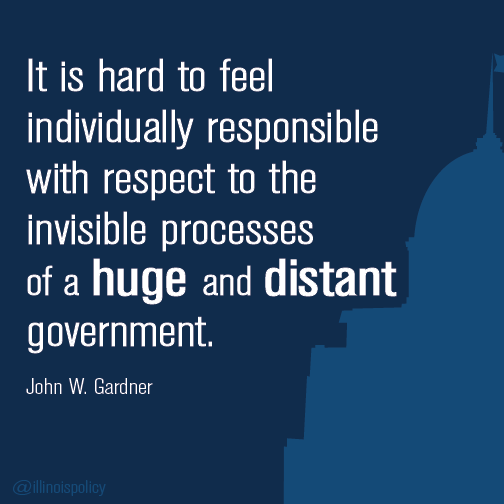QUOTE OF THE DAY
Forbes: A Taxing Tale Of Two States: Illinois And Kansas
Much of the political spotlight across the country is focused on the economies of two Midwestern states – Illinois and Kansas.
These two states have adopted opposite economic growth and jobs strategies. In Kansas, Republican governor Sam Brownback cut income tax rates in 2013 on workers and small businesses, while in Illinois, in 2011 Democratic governor Pat Quinn raised the personal income tax rate to 5 percent from 3 percent with the corporate tax climbing to 9.5 percent- one of the most punitive rates in the nation. This was the biggest tax increase in Illinois history.
Both of these governors have come under attack nationally for their policies. So it’s worth examining which model has worked better.
The Southern: Poverty woes continue in Illinois
Many Illinoisans remain locked in poverty despite national economic gains made since the Great Recession, according to a recently released report.
“What we hear is, ‘Recovery for who?’ The recovery is happening too slowly,” said Jennifer Clary, senior research associate at Heartland Alliance’s Social IMPACT Research Center.
The state made few gains between 2012 and 2013 in its “constitutional charge” to eliminate poverty, says the report released this month by the Illinois Commission on the Elimination of Poverty.
The Daily Journal: Is Texas better than Illinois? Former state rep who made the move says, yes
Pam Roth packed her bags and moved to Texas last year.
That in itself isn’t unusual.
Illinois, after all, ranked second in the nation for people leaving for other states in 2013 according to a United Van Lines migration study. Texas ranked seventh in the nation for people moving in, according to the same study.
Daily Herald: Illinois county fairs wither as state lessens financial aid
The grandstands sat empty on what should have been the Macon County Fair’s opening night. Instead of a stage with pageant contestants in sparkling gowns, the central Illinois arena held only 20 truck loads of dirt spread out for a makeshift go-kart track.
The 158-year-old fair is broke.
Organizers canceled the event in favor of a scaled-down festival this year as the board struggled to pay about $300,000 of debt. The fair’s demise in the county about 180 miles south of Chicago shows the vulnerability of a pastoral institution. The number of U.S. farms has dropped six straight years, and with them demand for entertainments that convened growers who spend much of the year in their fields.
ABC News: A Look at Regulations for Mobile-Based Businesses
Allows car services to operate so long as they follow the city licensing process for operating as a for-hire “black car” livery service.
—California: Requires licensing from state public utilities commission as well as criminal background checks, driver training programs, and at least $1 million in insurance coverage.
—Chicago: Assesses licensing fees and requires companies to submit to background checks, vehicle inspections, drivers’ tests and random drug screens as well as have $1 million in commercial auto liability coverage.
—Seattle: Recently rescinded a law limiting the number of ridesharing vehicles that could be on city streets. Now requires drivers to be licensed with city and meet certain insurance requirements.
Daily Herald: Tech-friendly cities struggle with new biz rules
A renowned technology hub that is home to some of the country’s top universities, Boston is emerging as an unlikely battleground for web-based businesses like Airbnb and Uber, with some saying more regulations are needed to prevent the upstarts from disrupting communities and more established industries.
Boston, prompted by the arrival of the mobile app Haystack, recently banned services that allow people to offer their public parking spaces for sale. Now the City Council is considering restrictions on ride-sharing services like Uber, Lyft and Sidecar and lodging websites like Airbnb, HomeAway and FlipKey, which allow users to book short-term stays in private residences. Across the river in Cambridge, home to Harvard and MIT, officials have been trying for years to restrict rideshares.
From New York to San Francisco, cities have been wrestling with the same questions and developing solutions ranging from outright bans to minimum safety requirements. At the heart, officials say, the issue is about balancing public safety and governmental oversight with the services’ growing popularity.
Daily Herald: Government takes on the Internet
Should the company that supplies your Internet access be allowed to cut deals with online services such as Netflix, Amazon or YouTube to move their content faster?
The Federal Communications Commission is tackling that question this fall after the public submitted a record 3.7 million comments on the subject — more than double the number filed with the regulatory agency after Janet Jackson’s infamous wardrobe malfunction at the 2004 Super Bowl.
The FCC’s chairman, former industry lobbyist and venture capitalist Tom Wheeler, says financial arrangements between broadband providers and content sites might be OK so long as the agreement is “commercially reasonable” and companies disclose publicly how they prioritize Internet traffic.
CNBC: Federal workers get handcuffed over porn problem
One lawmaker just introduced a bill that zeroes in on a very specific issue that has apparently plagued the federal government for years—porn.
That’s right.
There is now legislation, authored by Rep. Mark Meadows (R-NC) that would ban employees from looking at porn during work.
CARTOON OF THE DAY

